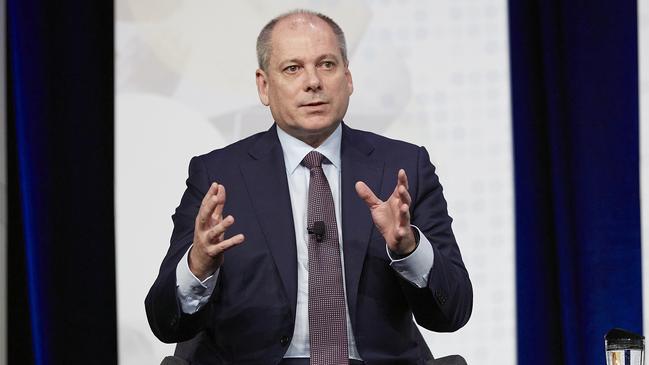Westpac ‘doesn’t align’ fully with Albanese government’s payments strategic plan
The banking major says the Albanese government’s payment proposal will give banks direction and allow them to better protect customers from scams.
Westpac “doesn’t align” on the full set of proposals to overhaul Australia’s payments systems announced by the Albanese government, but welcomes finally having certainty and a road map to improve productivity.
As part of the country’s biggest overhaul of payments in decades, the government’s “strategic plan for Australia’s payments system” focuses on boosting competition, productivity and innovation, strengthening payments infrastructure, modernising regulatory frameworks and lifting cyber security investment to combat scams and fraud.
“As the Treasurer said, we didn’t align on everything. But I think what we’ve got is a really good road map to take the country and the system forward,” Westpac chief executive Peter King said at the Australian Banking Association conference on Wednesday.
“For the productivity of the banks and the economy, having a direction and moving that way is fantastic,” he said.
Treasurer Jim Chalmers earlier told industry delegates at the conference they would be consulted on the plans to modernise the “clunky” system, which includes phasing out cheques and the Bulk Electronic Clearing System (BECCS) in favour of the New Payments Platform (NPP), and aligning consumer data right laws with an updated payment regulatory framework.
The current BECCS uses manual entry of BSB and bank account numbers for payroll payments by businesses and governments.
Dr Chalmers said the government would seek “common ground where that’s possible, and compromise where it’s not”. Neither him, nor Mr King said where the misalignment on the proposed reform was. Submissions on the “complex” set of proposals close July 5.
The proposals introduce new ministerial powers that can be “exercised in the national interest” and expand the regulatory scope of the payments regulation, giving extra powers to the Reserve Bank of Australia to police all payments systems participants, including digital wallets, through a new licensing regimen.
That would include digital wallets provided by US tech giants Google and Apple, as well as the mobile payment service from Chinese messaging app WeChat.

In the past five years, the use of mobile wallets and apps has increased 12,000 per cent, a study commissioned by the Australian Banking Association and published on Wednesday said.
Bendigo and Adelaide Bank CEO Marnie Baker welcomed the “certainty” the government’s plan provides, saying banks would ensure no vulnerable customers that still use cheques were left behind.
“On behalf of the mid-tier and smaller banks from an investment perspective, it makes it a lot clearer in relation to where you do need to place your investment,” she said.
“I do recognise that this does mean change for some people … especially in relation to things like (the phasing out of) cheques,”
Given all cheques used by institutional and commercial clients could be serviced through internet or mobile banking, as well as 98 per cent of retail cheques, Dr Chalmers said the government will wind down the cheque system by no later than 2030.
“It was something that was coming because cheques have been in decline now for many years, so that is something we do need to address. It has become very costly and that cost is then borne by our customers,” Ms Barker said.
She highlighted there was a group of people that still used cheques – “some of them are more elderly or more vulnerable or even in more remote areas within Australia,” she said, and the transition period would give banks time “to work with your customers to ensure that they aren’t left behind.”
Mr King from Westpac said phasing out BECCS would allow banks to better protect customers from scams, which last year led to more than $3bn in losses.
“One of the issues we have with the BECCS system is you can’t check the name of the account to transfer into,” he said. “So the big thing about moving to NPP is … you actually can check where you’re transferring money to.”
“That’s one of the biggest issues we have in the way that you move money around and … I would argue that by itself, when you think about the link to scans and consumers, is why we should do.
“It is a big change though, so we will need all corporates, as well as the banks as well as consumers to get themselves on NPP.”
Australian Public Service departments and agencies are expected to transition out of BECCS and into new forms of payments by 2028, according to the plan.
Commonwealth Bank, which had been calling for big tech payment platforms to be regulated, said the bank was supportive of the government’s plan as it added certainty to the system.
“We are supportive of a regulatory framework that covers all participants to ensure the safety and efficiency of the payments system while also fostering innovation,” a spokesman said in a statement.
“We believe customers will be the ultimate beneficiaries, by ensuring consistent consumer protections within a modern and efficient system.”





To join the conversation, please log in. Don't have an account? Register
Join the conversation, you are commenting as Logout